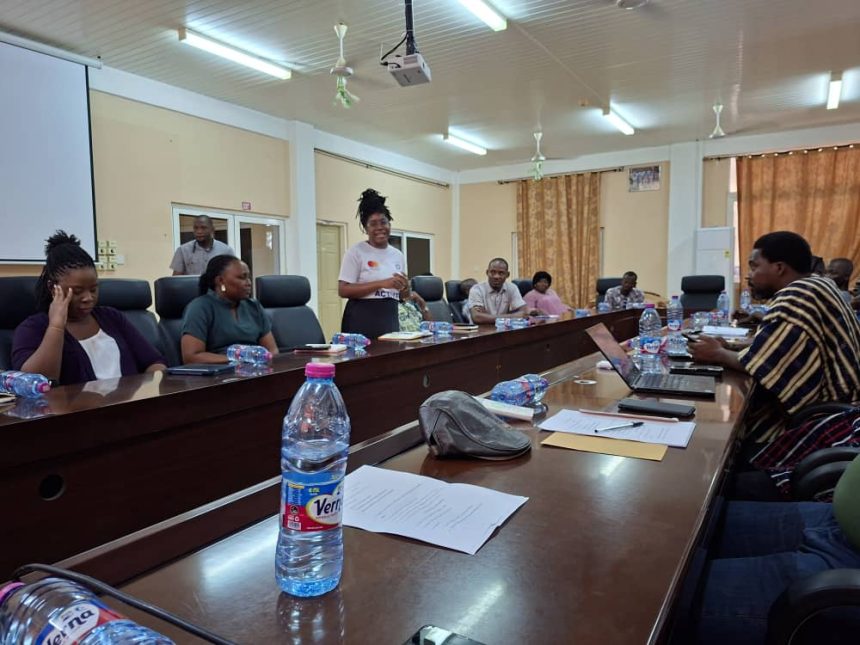Thirty-six lecturers of the Bolgatanga Technical University (BTU) have received training on how to tap resources from International Business Machines Corporation (IBM) SkillsBuild digital modules to enhance teaching and learning.
IBM SkillsBuild modules are learning resources provided through a unified platform where users can access shared content and services to support learning, research, and professional development.
The training formed part of activities under the Digital Skills Training of the Integrated Digital Competency and Jobs Accelerator Project (IDAP), which is being piloted by BTU, with funding support from the United Nations Capital Development Fund (UNCDF) under the European Union-Ghana Pact for Skills project.
The two-and-a-half-year pilot initiative aims to equip graduates with innovative digital skills to boost their employability and entrepreneurial potential.
The beneficiaries were drawn from the Departments of Electrical and Electronics Engineering, Ecological Agriculture, Computing and Information Technology, Hospitality Management, and Liberal Studies.
All participants are expected to complete the selected IBM SkillsBuild learning paths and earn their digital badges and/or certifications by the end of the programme.
Dr Benjamin Apam, the Lead Digital Skills Trainer on the project and facilitator of the sessions, explained that IBM provided an integrated digital environment where multiple modules shared and utilised common resources
He said lecturers were expected to integrate IBM SkillsBuild into their teaching, noting that the platform hosts numerous relevant digital resources that could significantly enhance teaching and learning.
Dr Apam added that the project seeks to embed digital skills modules within career pathways while establishing a Digital Skills and Employability Hub at BTU.
Also, the hub would empower Ecological Agriculture students to deploy AI and GIS for crop monitoring and land-use planning.
Electrical and Electronics Engineering students will be trained in cybersecurity for IoT systems, while Computing and Information Technology students will gain skills in data analytics for business and software development.
“The project will align its modules with GTEC’s competency-based curriculum guidelines, as well as relevant policy frameworks,” he emphasised.
Dr Apam noted that project performance indicators include: 75 per cent of graduates completing at least one career-embedded digital badge, 60 per cent of engineering students completing cybersecurity or IoT certification before final year, 40 per cent of agriculture students producing digital portfolio projects; 36 per cent faculty certified in digital training delivery; and 60 per cent employer satisfaction with graduates’ digital readiness.
The project would collaborate with key external stakeholders including IBM (modules and certification), UNCDF (support), AGI (industry validation), the Ministry of Education and GTEC (policy alignment), as well as employers such as agro-processing firms, renewable energy companies, ICT firms, and the BTU Alumni Association.
Mr Alexis Adugdaa Ayamdor, the Project Lead, explained that the initiative stemmed from a feasibility study conducted by the team whose findings revealed weak integration of ICT into non-ICT disciplines, inadequate industry-recognized certifications for graduates, and limited faculty capacity in advanced digital areas.
“This prompted us to seek support from the EU-UNCDF through a proposal, and fortunately, we secured the funding, leading to the implementation of this project,” he stated.
Mr Ayamdor said the project aimed to ensure that BTU graduates leave with industry-specific digital competencies.
Expected outcomes, he noted, include graduates combining technical skills with digital proficiency, enhanced employability and entrepreneurship across sectors, faculty capable of embedding digital tools into teaching; and institutionalised digital career pathways aligned with GTEC’s practice-oriented mandate.
The lecturers expressed satisfaction with the training, stating that the sessions had equipped them with the knowledge and confidence to deploy digital tools to enhance academic delivery.
“With this capacity training, I will no longer struggle to find teaching and learning materials. I can now log in and access the IBM modules to support my teaching and guide my students,” Dr. Oswin Aganda Anaba, a Senior Lecturer and Head of the Liberal Studies Department said.
GNA






